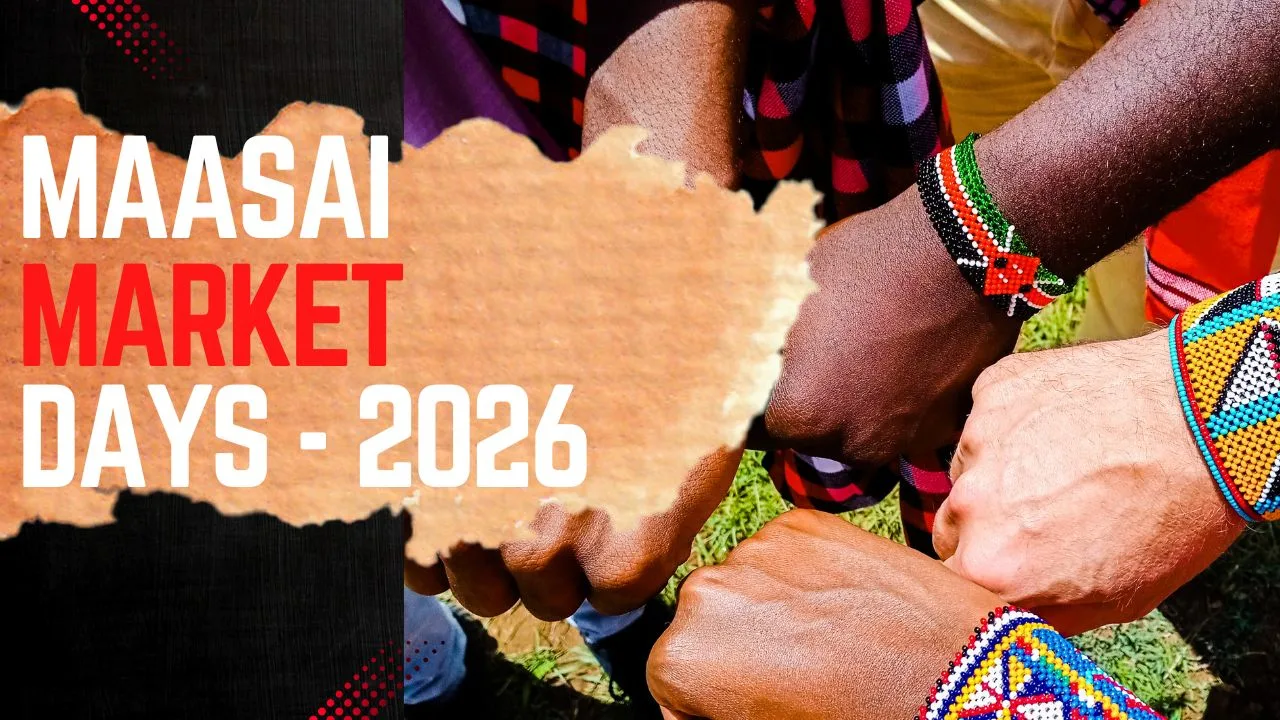The Maasai Market is a mobile open-air market in Nairobi where local artisans sell handmade crafts and souvenirs. Its location changes daily throughout the week. The market provides a direct connection to Kenyan culture through its products. Below is the general weekly schedule for 2025.
- Monday: Nairobi Railway Station
- Tuesday: Kijabe Street and Yaya Centre
- Wednesday: Capital Centre and Village Market
- Thursday: Junction Mall and Gikambura
- Friday: Village Market and Nairobi National Museum
- Saturday: High Court Parking Lot and Ngong Road Shopping Centre
- Sunday: Yaya Centre and Junction Mall (Ngong Road)
Note that these locations can sometimes change due to city regulations or other logistical reasons. It is always a good practice to confirm the venue locally if possible.

What is the Maasai Market?
The Maasai Market is an open-air craft fair where vendors sell a wide range of handmade Kenyan goods. Items for sale include beaded jewellery, Maasai shukas (blankets), wooden carvings, soapstone sculptures, paintings, batik fabrics, leather sandals, and woven baskets known as kiondos. Most products represent different aspects of local culture. Haggling, or bargaining, is a common and expected part of the purchasing process between vendors and buyers.
Maasai Market Weekly Schedule in Nairobi 2025
The Maasai Market operates in different locations across Nairobi each day. Some days may feature markets at multiple venues simultaneously. Below is a detailed breakdown of the known locations for each day of the week.
Monday
The market is traditionally less active on Mondays. However, a small market can be found at Adam's Arcade on Ngong Road. A newer, more prominent Monday market is now located at the Nairobi Railway Station.
Tuesday
On Tuesdays, you can find the market at several locations. The traditional venue is on Kijabe Street, opposite the Norfolk Hotel. Other Tuesday markets operate at Prestige Plaza on Ngong Road and at Yaya Centre in Hurlingham.
Wednesday
The Capital Centre on Mombasa Road hosts a well-known Wednesday market, often noted as being less crowded. Another market takes place at the Village Market in Gigiri on the same day.
Thursday
Thursdays offer multiple options for shoppers. The market is held at the Junction Mall on Ngong Road and also at Lavington Mall. A newer location at Gikambura, near Kiambu Road, also operates on Thursdays.
Friday
The upper car park of the Village Market in Gigiri is the classic Friday venue. Additional markets are often found at Lavington Mall and the Nairobi National Museum on Fridays.
Saturday
The High Court parking lot in the city centre is the long-standing Saturday location. You can also find vendors at Prestige Plaza on Ngong Road and at the Ngong Road Shopping Centre on this day.
Sunday
The primary Sunday market is held at Yaya Centre in Hurlingham. Another market operates along Ngong Road, near the Junction Mall, providing a second option for weekend shoppers.
Practical Tips for Visiting the Maasai Market in Nairobi, Kenya
A visit to the Maasai Market is a rewarding experience. The following tips will help you navigate the market effectively.
Bargaining and Haggling
Bargaining is an expected part of the shopping process. A common strategy is to start by offering about half of the initial asking price. Engage with vendors politely and be prepared to negotiate until you reach a price that is fair for both you and the artisan.
Payment Methods
Cash is the preferred method of payment. While some vendors may accept mobile money (M-Pesa), transactions are faster and simpler with Kenyan Shillings. It is advisable to carry small denominations to make payments easier.
Best Time to Visit and Opening Hours
The market generally operates from 8:00 AM to 6:00 PM. Arriving early in the morning allows you to browse the stalls before the large crowds arrive, creating a more relaxed shopping environment.
Safety and Etiquette
As in any busy market, keep your valuables secure. Always ask for permission before taking photographs of the vendors or their products. This shows respect for the artisans and their work.
What to Buy at the Maasai Market
The market offers a diverse range of handmade crafts and souvenirs. Below are some of the most popular items to look for during your visit.
- Beaded Jewellery: This includes brightly colored necklaces, bracelets, and earrings that reflect traditional Maasai artistry.
- Textiles: Look for Maasai shukas (blankets), light cotton wraps known as kikoys, scarves, and decorative table runners.
- Wood and Soapstone Carvings: You will find a variety of animal figurines, traditional masks, bowls, and other utensils carved from wood or soapstone.
- Leather Goods: Items such as handmade sandals, bags, belts, and wallets are commonly available.
- Woven Baskets: Kiondos, which are woven carry-all bags, are sold in both natural and colorful striped designs.
- Local Art: Many stalls feature vibrant paintings that depict Kenyan landscapes, wildlife, and cultural scenes.
Why the Maasai Market Schedule Changes
The Maasai Market's schedule is not permanent and can change for several reasons. The Nairobi County government regulates where and when vendors can operate, and changes in city permits can lead to new locations being added or old ones removed.
Additionally, logistical issues such as mall renovations, construction, or security considerations can force the market to relocate. Because the schedule is fluid, it is always a good idea for visitors to seek local confirmation before heading out.